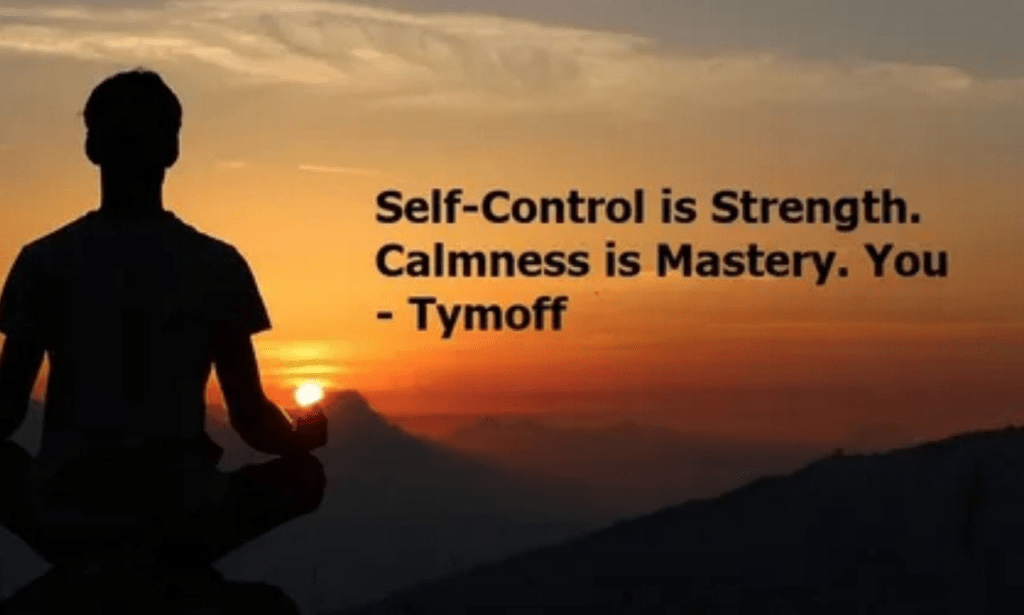In a fast-paced, often chaotic world, maintaining control over your mind and emotions is no small feat. The quote by Tymoff, “Self-control is strength. Calmness is mastery. You”, speaks directly to the heart of personal growth and emotional intelligence. It’s a reminder that true power lies not in domination of others, but in the quiet and steady governance of oneself. This article explores the deep meaning behind these words, unpacking how self-control and calmness are not only virtues but tools for achieving personal mastery.
Understanding Self-Control: The Foundation of Strength

What Is Self-Control?
Self-control is the ability to regulate your emotions, thoughts, and behaviors in the face of temptations, impulses, or distractions. It is not about suppression but rather about wise direction—choosing long-term goals over short-term gratification.
Why Is It a Strength?
When you can hold your temper, delay gratification, or resist a distraction, you exercise control that few people manage consistently. This restraint gives you power over your circumstances, rather than letting them dictate your actions.
Key Benefits of Self-Control:
- Improved focus: It keeps you aligned with your priorities.
- Emotional resilience: You can better manage stress, anger, or anxiety.
- Better decision-making: It helps you think clearly before acting impulsively.
- Healthier habits: Self-discipline leads to better lifestyle choices.
- Personal integrity: You act in line with your values, even when it’s hard.
How to Develop Self-Control
1. Set Clear Goals
Having a defined purpose helps direct your focus and reduce distractions.
2. Practice Mindfulness
Mindfulness meditation trains the mind to observe thoughts without reacting impulsively.
3. Avoid Temptation
Recognize triggers and structure your environment to reduce exposure to them.
4. Build Strong Routines
Consistency builds discipline. Start small—establish a morning routine, journal, or allocate fixed time for reflection.
5. Delay Gratification
Train yourself to wait for rewards. It strengthens your impulse control over time.
6. Learn from Mistakes
Self-control isn’t perfection. Recognize setbacks as learning moments, not failures.
Embracing Calmness: The Path to Mastery
What Is Calmness?
Calmness is the ability to remain composed and centered regardless of external chaos. It’s not about being passive but being anchored. Calm people think more clearly, act more deliberately, and inspire confidence in others.
Why Is It Mastery?
Mastery implies command—not just of tasks, but of oneself. Calmness shows you are no longer reactive, but responsive. It signals emotional maturity, self-awareness, and inner strength.
Benefits of Calmness:
- Mental clarity: A calm mind is a focused mind.
- Relationship health: You communicate better and avoid escalation during conflict.
- Stress reduction: Less anxiety, more serenity.
- Enhanced leadership: People trust and follow those who remain calm under pressure.
- Increased creativity and insight: A relaxed mind allows for new ideas to emerge.
How to Cultivate Calmness
1. Meditation and Breathing
Breathing techniques like deep diaphragmatic breathing reset your nervous system and reduce stress.
2. Prioritize Rest
Sleep, nutrition, and downtime directly affect your emotional regulation.
3. Exercise Regularly
Physical movement clears emotional buildup and enhances mood-regulating hormones.
4. Let Go of Control
You don’t have to control everything—just your response. Acceptance is a form of calmness.
5. Limit Stimulation
Take breaks from screens, notifications, and social media to avoid overstimulation.
6. Practice Empathy
Understanding others’ perspectives reduces friction and promotes peace.
The Synergy: Self-Control + Calmness = Mastery of Self
These two qualities reinforce each other. Self-control supports calmness by reducing impulsive reactions. Calmness enhances self-control by creating mental space to pause before acting. Together, they form the emotional armor that shields you from life’s inevitable storms. A person with self-control can endure, and one with calmness can lead. Imagine being in a heated argument but choosing not to raise your voice. Or facing a career setback without panicking, because you trust your plan. That is the combined power of strength and mastery—of self-control and calmness.
Conclusion: The Mastery Is You
Tymoff’s quote ends powerfully with the word “You.” It points inward. It’s not about others. It’s about your growth, your peace, your potential. You are the one with the ability to be strong through self-control and powerful through calmness. In a world that often rewards loudness and haste, choose silence and steadiness. Choose control over reaction. Choose calm over chaos. Because in the end, the greatest mastery you can achieve is mastery of yourself.



